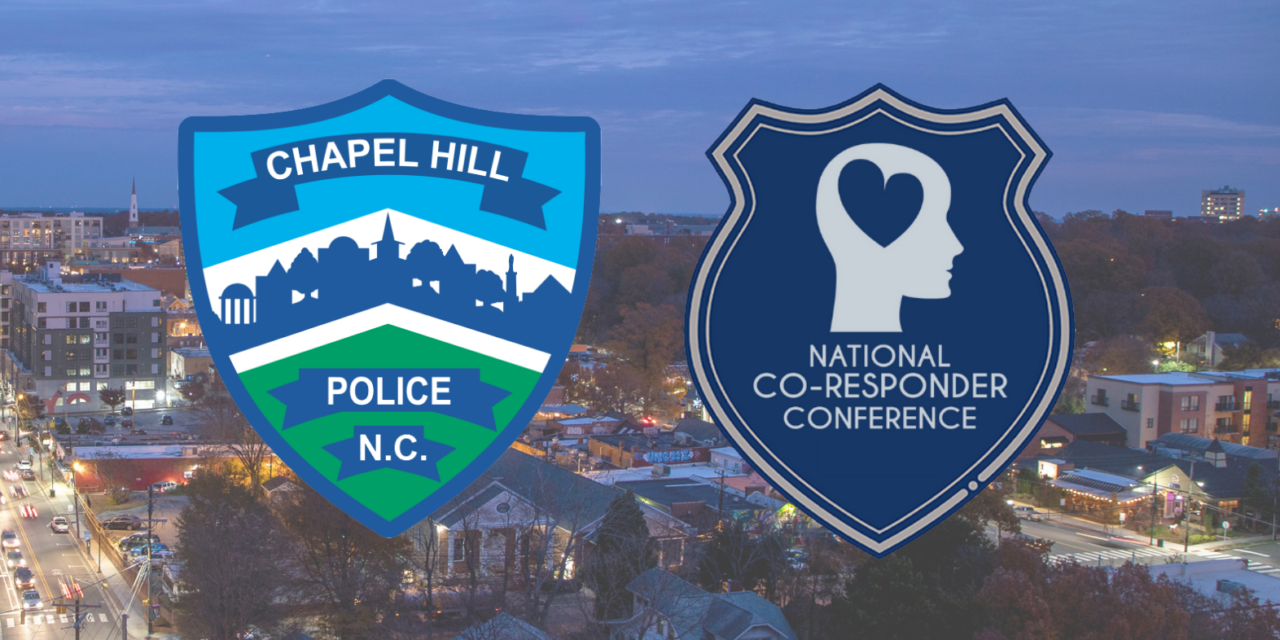Chapel Hill is the site of this year’s National Co-Responder Conference and the town police department’s history with co-responding practices helps make it a fitting place to host the event.
The conference, which is in its third year, is for police departments looking to better address mental health events and crisis cases within communities. This year, the activities and discussions meant to share insight are hosted at the Carolina Inn on Pittsboro Street.
As more and more discussions of public safety have happened in recent decades, it’s become clear on a national level: a police response is not always the best response for a case or call. That is something Chapel Hill Police Chief Chris Blue acknowledges and is part of why he says he’s proud of the department’s Crisis Unit.
“When we talk about co-responding,” Blue said, “we talk about clinicians, social workers responding with law enforcement – sometimes instead of law enforcement or taking over when people are in crisis. They call for help, and in this community since 1973, we have known that plenty of calls coming to 911 are really not best served by law enforcement.”
Chapel Hill developed its own Crisis Unit in 1973, with former Mayor Howard Lee being a major advocate for the development. Introducing human services workers into the police response means trained professionals are there to help in mental health crises, domestic violence cases, runaway children or even the treatment of traumatized victims of other crimes.
Now, Blue estimates the co-responding crisis team gets called to cases a dozen times a day.
“We’ve got six people right now,” he told 97.9 The Hill ahead of the National Co-Responder Conference. “We’re always trying to grow it. [The] Town Council was nice enough to add a position last year for us, and we’ve actually just reclassified another position into the Crisis Unit. We’ve been kind of blazing the trail for a long time in that regard.”
A key aspect of co-responding is making sure the person in crisis not only stays safe, but is connected to the right local resources. Blue said to help with that, the Crisis Unit aims to have employees who can relate to the subject and convey the best path forward. Since Orange County has several helpful resources, Chapel Hill’s co-responding techniques stress finding ways to divert people from the criminal justice system and into places tailored for people’s needs.
“That’s a win for everybody,” said Blue. “That’s consistent with a more wholistic approach to community safety. To get people to take advantage of those many resources in our community, sometimes that’s a little bit of a sales job. So, folks who have had that experience themselves we think will be able to speak in a unique and experienced way with the folks who need it the most.”
Blue said in addition to those who need help benefitting from the Crisis Unit in Chapel Hill, his police officers often do too.
“You’ve heard me brag on our employees many times,” said Blue. “They do tough, important, difficult work in a special way, in the Chapel Hill way. And I believe that is very much influenced by the presence of our Crisis Unit within our organization. Our officers simply think about problem-solving differently, think about how they might respond differently. They pick up techniques and ways of engaging from their Crisis Unit colleagues that I think make them outstanding law enforcement professionals.”
So, what is happening at the national conference? A packed agenda with keynote speakers, workshops, panels and breakout sessions at the Carolina Inn. Ranging from co-responder case management to topics as specific as cognitive behavioral therapy, law enforcement leaders from across the U.S. will hear about many angles of the co-response model.
Blue said he believes police departments just beginning to explore that model will be best served by this week’s gathering, including several panels hosted by Chapel Hill employees.
“Particularly for organizations going down this road of starting this kind of program,” the police chief said, “there will be a session on the legal considerations of the co-responder model. ‘What does that look like in your organization from a policy point of view?’ That kind of thing. There’s a session on responding to young people experiencing a mental health crisis, and on and on and on.”
“We’re really excited about it,” Blue added, “and proud that our community gets to host.”
To learn more about the National Co-Responder Conference, visit the event’s website. To learn more about the Chapel Hill Crisis Unit, click here.
Photo via the Town of Chapel Hill.
Chapelboro.com does not charge subscription fees, and you can directly support our efforts in local journalism here. Want more of what you see on Chapelboro? Let us bring free local news and community information to you by signing up for our biweekly newsletter.


